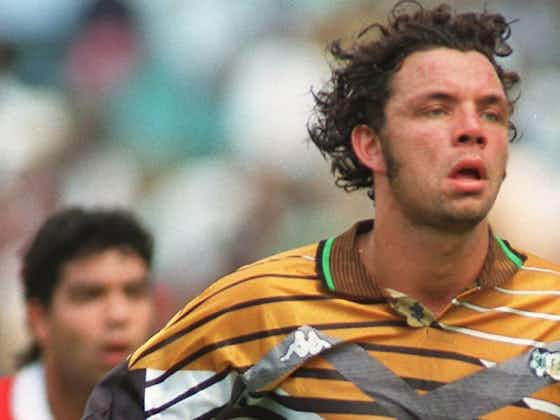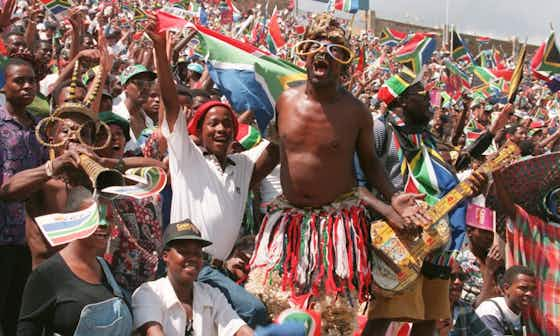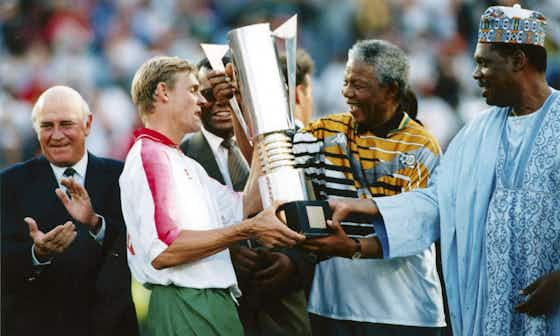Planet Football
·14 January 2022
Mark Fish: ‘Our AFCON 96 win helped Nelson Mandela unite South Africa’

In partnership with
Yahoo sportsPlanet Football
·14 January 2022

As a player, Mark Fish won multiple honours at Orlando Pirates, enjoyed a spell in Serie A with Lazio and earned cult status for Bolton Wanderers and Charlton Athletic in the Premier League.
Yet arguably his greatest achievement as a professional came while playing in the yellow and green of South Africa at the 1996 Africa Cup of Nations.
South Africa had spent the previous three decades in the international footballing wilderness having been expelled from FIFA due to apartheid. Yet by 1991, things were beginning to change with the formation of a new multi-racial South African Football Association.
Though Bafana Bafana failed to qualify for the 1994 Africa Cup of Nations, they earned a place at the finals automatically two years later as a late replacement for original hosts Kenya.
Even so, the tournament curtain-raiser against Cameroon represented something of a baptism of fire for the hosts, with the Indomitable Lions World Cup regulars and one of the continent’s strongest teams.
Yet Fish says that having such a huge game to focus helped stave off any talk of wider ambitions for the tournament. “Obviously we wanted to do as well as we could,” he says. “But we just went into that opening game against Cameroon, saying to ourselves, ‘Just get over the first hurdle.’”
Bafana Bafana passed that first test with flying colours, running out 3-0 winners, courtesy of goals from Phil Masinga, Mark Williams and John Moshoeu.
“We could have scored five or six against the number one ranked team on the continent,” Fish recalls. “After that, we certainly felt we could go further in the tournament.”
Even then, they went into the next game feeling with expectations low. A single goal from Williams secured a 1-0 win over Angola and guaranteed South Africa top spot in the group. That set up a tough quarter-final against Algeria with Fish acknowledging that the “pressure was beginning to build” by this point.
Though a much-changed South Africa team had gone down 1-0 to Egypt in their final group game, Algeria proved by far their toughest opponents yet in a topsy-turvy game which, in truth, could have gone either way.
“They were difficult to play against,” Fish says. “Very well organised and they played very much the old defensive European style of football. It was a really rainy, wet day too and the stadium was maybe a quarter full.”
Fish recalls South Africa manager Clive Barker telling him his “job was to defend.” So naturally, he opened the scoring, pouncing on a loose ball in the box to stab the ball past Omar Hamenad in the 72nd minute.

South Africa fans during the AFCON 1996 final between South Africa and Tunisia. FNB Stadium, Johannesburg, February 1996.
Though primarily a defender, Fish regularly found himself pushing forward to add an extra dimension to the South African attack at the finals. It was a habit that proved useful, even if Fish remembers Barker despairing of it.
“He would be pulling his hair out, not wanting me to go forward,” Fish explains. “But I played as a striker until I was 17. It was only after I signed for a professional team and they asked me to play in defence, that I switched. I still had that instinct to want to score goals.”
Ultimately Barker was forced to deploy holding midfielder and future Barnsley player Eric Tinkler as cover during his star defender’s regular forays.
As fond a memory as his first international goal may have been, Fish didn’t have long to celebrate, with Algeria levelling things up just 12 minutes later through Tarek Lazizi.
But a frantic final 15 minutes saw South Africa come roaring back with Moshoeu scoring a spectacular goal to seal a 2-1 victory that left the team and the nation as a while dreaming of more success on the sporting stage, just a year after the Springboks lifted the Rugby Union World Cup on home soil.
“By the semi-final, most of the country was watching Bafana Bafana and cheering us on,” Fish remembers. “We made the country more aware of who Bafana Bafana were. Everyone knew who the Springboks were, but as the tournament grew, we made the rest of the country aware.”
A semi-final showdown with Ghana, a team spearheaded by Leeds cult hero Tony Yeboah, represented what Fish describes as the “biggest test” of their tournament credentials.
Fortunately, in Lucas Radebe, South Africa had their own Leeds legend to call on. A future Bafana Bafana captain who had recovered from a serious knee injury to play at the tournament, Fish recalled Radebe’s quiet influence on the pitch.
“He was not a verbal person. He led by example,” he says. “He was not going to shout and scream like some do. It was an honour to play with him.”
• • • •
• • • •
Fish regarded that game with Ghana as something akin to a de facto final. “That was a good Ghanaian team. No disrespect to Tunisia [who they played in the final], but it felt like whoever won out of us and Ghana would lift the trophy.”
By this point, the pressure was building. Fish recalls feeling that the game was bigger than the team, the fans and maybe even the country as a whole.
“Unfortunately, because of South Africa’s history and politics, whole generations of phenomenal footballers didn’t get to play on the world stage,” he says.
“So ‘96, was not only for us as footballers that were coming into the game, it was footballers from the 60s, 70s, 80s that were not able to represent the national team. It was about more than just football for us.”
It was another future Premier League star who made the crucial impact against Ghana in the semi. Already 1-0 up thanks to a goal from star man Mosheou, barely a minute had gone in the second half when a young Shaun Bartlett fired home the crucial second to give the hosts breathing space.
Though Ghana pushed for a way back into the game, Radebe, Fish and company kept the Black Stars at bay before Mosheou bagged his second and South Africa’s third to seal a famous 3-0 win.
Despite the scores staying level until the 73rd minute, there was a sense of inevitability about South Africa’s triumph over Tunisia in the final. Mark Williams had struggled for form at Wolves, but here he was the hero, coming off the bench to score twice in two minutes.
Though Fish scored his first goal for South Africa at the tournament, his fondest memories remain lifting that trophy at Soccer City in Johannesburg in the presence of Nelson Mandela, F.W. de Klerk and Bishop Desmond Tutu.
“What we had achieved, for the nation, was more than just football,” he says. “It fed into Mandela’s idea of Madiba magic. He wanted to bring the country together through sports and he certainly achieved that.”

FW de Klerk, President Nelson Mandela and Issa Hayatou, CAF President, congratulating captain Neil Trovey at the 1996 AFCON finals. FNB Stadium, Johannesburg, February 1996.
The only tinge of sadness Fish feels is for the fact South Africa didn’t go on to achieve more with the talented generation of players that began to filter through. Players like Benni McCarthy, Steven Piennar and Quinton Fortune.
“Unfortunately, it’s always about ’96 and what we achieved,” he says.
South Africa would go on to reach the final of the 1998 Africa Cup of Nations, losing 2-0 to Egypt, and despite qualifying for the next two World Cups, would narrowly miss out on reaching the knockout phase.
While Nigeria is often touted as the African side that failed to live up to their considerable talent, the same could easily be said about Bafana Bafana.
Fish puts that down to a failure to retain Barker, the architect of the national team’s success at the 1996 AFCON.
A mainstay of the South African domestic football scene who earned the nickname “The Dog” during his 40-year stint in the game, Barker resigned after South Africa’s disappointing performance at the 1997 Confederations Cup.
“He was everything you could want from a national team coach and was a lot more tactically aware than most people gave him credit for,” Fish said.
“Clive motivated us and made it feel like we could lead any team in the world and we certainly gave our utmost for him on the field. He was a father figure and that led to us being like a family of warriors on the field, we all looked out for each other.”
Though Fish acknowledges Barker’s replacement, Jona Somo, did a commendable job in getting them to the 1998 AFCON final, he is less complimentary about the man that then stepped in to take South Africa to the 1998 World Cup, Philippe Troussier.
“The federation decided they needed a foreign coach and put in Troussier who, for me, was one of the worst coaches I’ve ever played for,” he said. “I’ve nothing against him, personally, it was just the way he treated players and how he looked at play.
“If we had had Clive, a local coach who knew the players, I think we would have done a bit better at that World Cup. Clive resigning had a big impact on South Africa as a footballing country.”
Indeed, since 1997, South Africa have had no fewer than 15 different managers or caretaker managers in charge, with a number completing multiple stints. Despite hosting the World Cup in 2010, a return to the glory days of the 1990s seems a long way off – South Africa failed to qualify for AFCON 2021.
“We’re playing catch-up to the rest of the continent at the moment,” Fish says.
“Because we were hiring and firing coaches there’s been no real national team development. Whether it’s from the president of the federation or within the federation with the players and coaches, ex-players and coaches, we need to work towards a common goal and make the team the pride of the nation again.”






























































